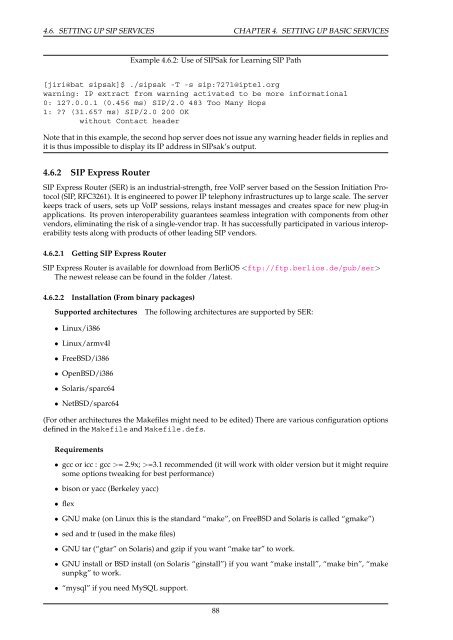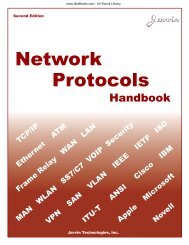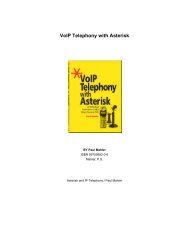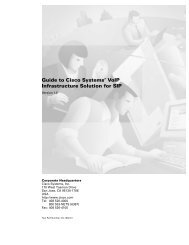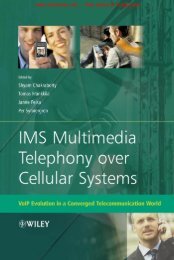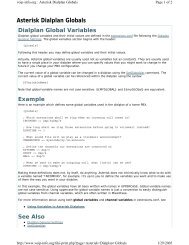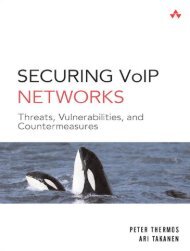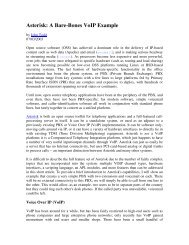IP Telephony Cookbook
IP Telephony Cookbook
IP Telephony Cookbook
You also want an ePaper? Increase the reach of your titles
YUMPU automatically turns print PDFs into web optimized ePapers that Google loves.
4.6. SETTING UP S<strong>IP</strong> SERVICES CHAPTER 4. SETTING UP BASIC SERVICESExample 4.6.2: Use of S<strong>IP</strong>Sak for Learning S<strong>IP</strong> Path[jiri@bat sipsak]$ ./sipsak -T -s sip:7271@iptel.orgwarning: <strong>IP</strong> extract from warning activated to be more informational0: 127.0.0.1 (0.456 ms) S<strong>IP</strong>/2.0 483 Too Many Hops1: ?? (31.657 ms) S<strong>IP</strong>/2.0 200 OKwithout Contact headerNote that in this example, the second hop server does not issue any warning header fields in replies andit is thus impossible to display its <strong>IP</strong> address in S<strong>IP</strong>sak’s output.4.6.2 S<strong>IP</strong> Express RouterS<strong>IP</strong> Express Router (SER) is an industrial-strength, free Vo<strong>IP</strong> server based on the Session Initiation Protocol(S<strong>IP</strong>, RFC3261). It is engineered to power <strong>IP</strong> telephony infrastructures up to large scale. The serverkeeps track of users, sets up Vo<strong>IP</strong> sessions, relays instant messages and creates space for new plug-inapplications. Its proven interoperability guarantees seamless integration with components from othervendors, eliminating the risk of a single-vendor trap. It has successfully participated in various interoperabilitytests along with products of other leading S<strong>IP</strong> vendors.4.6.2.1 Getting S<strong>IP</strong> Express RouterS<strong>IP</strong> Express Router is available for download from BerliOS The newest release can be found in the folder /latest.4.6.2.2 Installation (From binary packages)Supported architecturesThe following architectures are supported by SER:• Linux/i386• Linux/armv4l• FreeBSD/i386• OpenBSD/i386• Solaris/sparc64• NetBSD/sparc64(For other architectures the Makefiles might need to be edited) There are various configuration optionsdefined in the Makefile and Makefile.defs.Requirements• gcc or icc : gcc >= 2.9x; >=3.1 recommended (it will work with older version but it might requiresome options tweaking for best performance)• bison or yacc (Berkeley yacc)• flex• GNU make (on Linux this is the standard “make”, on FreeBSD and Solaris is called “gmake”)• sed and tr (used in the make files)• GNU tar (“gtar” on Solaris) and gzip if you want “make tar” to work.• GNU install or BSD install (on Solaris “ginstall”) if you want “make install”, “make bin”, “makesunpkg” to work.• “mysql” if you need MySQL support.88


